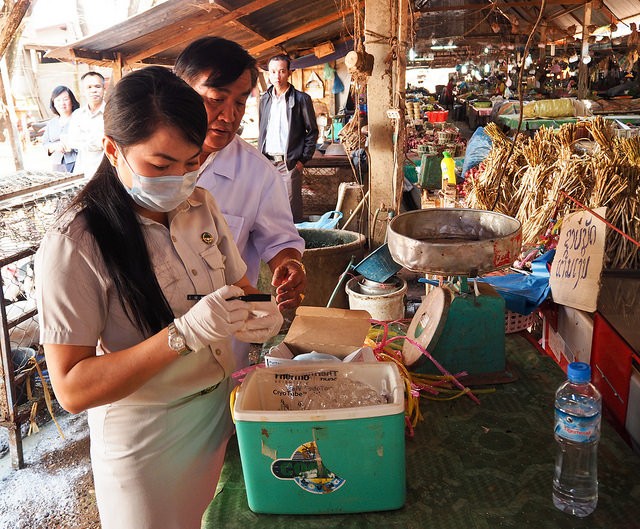
For Immediate Release
VIENTIANE, Lao PDR, May 9, 2016 -- Today, the Lao PDR Ministry of Agriculture and Forestry’s Department of Livestock and Fisheries launched a new U.S.-funded project to collect biological samples to help identify viruses that have the potential to move from animals to humans.
Under a memorandum of understanding signed by Lao officials and representatives from the U.S. Agency for International Development (USAID) PREDICT-2 project under the Emerging Pandemic Threats (EPT) program, teams will begin taking samples from wild animals, domestic animals and humans in Champasak Province this year. By collecting samples from humans, their livestock and wildlife that come into close contact, the partnership is taking an important, new step toward demonstrating how viruses can be shared.
"Surveillance programs in Lao PDR and around the world help us better understand how diseases emerge so we can develop strategies to prevent outbreaks and lessen the risk of pandemics," said Beth Paige, director for the USAID Regional Development Mission for Asia. "Keeping people and their livestock safe from infectious disease will also strengthen rural livelihoods and food security and help support a robust economy."
In Laos, the USAID program collaborates with the Department of Livestock and Fisheries, the National Animal Health Laboratory and the National Center for Laboratories and Epidemiology, and the Food and Agriculture Organization of the United Nations, to implement synchronized animal and human disease surveillance.
Working with host governments in 31 countries in Africa, Asia and the Middle East, including the Government of Lao PDR, PREDICT-2 is conducting surveillance to detect and prevent spillover of viruses with pandemic potential that can be transmitted between animals and humans, and identifying the behaviors, practices and conditions associated with virus spillover.
PREDICT-2 follows PREDICT (2009-2014), which was implemented in 20 countries around the world, including Lao PDR. Globally, PREDICT trained over 2,500 local project staff members from university and government partners to safely and humanely sample more than 56,340 nonhuman primates, bats, rodents and other wild animals (including from bushmeat) in areas with high risk of viral spillover from infected wildlife to humans. PREDICT developed low-cost diagnostic protocols for the detection and discovery of known and new viruses in 32 labs in the 20 countries in which this USAID program has been operational. Since 2009, PREDICT has detected 984 unique viruses—812 of which were previously unknown viruses—in wild animals and humans in regions where diseases are mostly likely to emerge.
The follow-on PREDICT-2 program is implemented by a consortium led by the University of California at Davis and includes Metabiota Inc., EcoHealth Alliance, Smithsonian Institution, and Wildlife Conservation Society. Metabiota Inc. is USAID’s implementing partner in Lao PDR.
Related Press Releases
- 10,000 Community Health Volunteers Receive Equipment from USAID’s Community Capacity for Health Program
- Afghanistan Ministry of Public Health Launches First Data Warehouse for the Health Sector with help from USAID
- USAID and the National Center or Healthy Lifestyles Promotion Conduct Training for Journalists on Tuberculosis Reporting







Comment
Make a general inquiry or suggest an improvement.